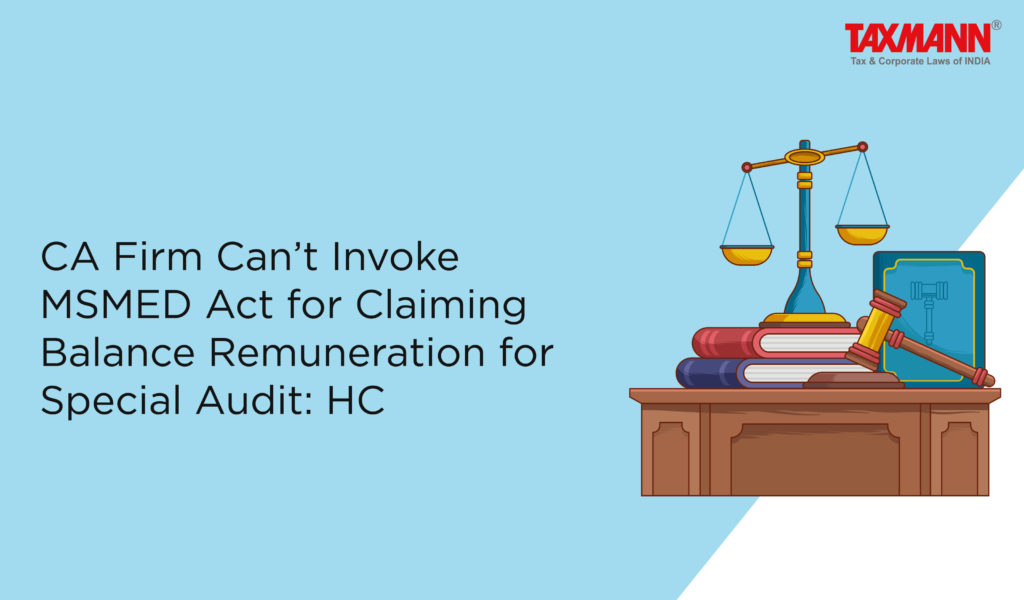CA Firm Can’t Invoke MSMED Act for Claiming Balance Remuneration for Special Audit: HC
- Blog|News|Income Tax|
- 3 Min Read
- By Taxmann
- |
- Last Updated on 11 July, 2023

Case Details: PCIT v. Micro And Small Enterprise Facilitation Council - [2023] 152 taxmann.com 177 (Delhi) [06-07-2023]
Judiciary and Counsel Details
-
- Prathiba M. Singh, J.
- Ruchir Bhatia, Shlok Chandra, Jr. Standing Counsel & Keshav Garg, Advs. for the Petitioner.
- Jitendra Kumar Singh & S.B. Gupta, Advs. for the Respondent.
Facts of the Case
A CA Firm, registered as a `Micro Enterprise’ under the provisions of the MSMED Act, being on the Income Tax Department (IT Department) panel, was nominated as a Special Auditor by the IT Department. After completing the said Special Audit assignments and submitting the final audit reports, the CA Firm raised four invoices in respect of the said audits.
After the invoices were raised, the full payment was not received. Accordingly, the CA Firm invoked the provisions of the MSMED Act and approached the Micro & Small Enterprise Facilitation Council (MSEFC) for arbitration.
Aggrieved by this, the Principal Commissioner of Income Tax filed the present writ petition challenging the directions for reference to arbitration by the CA Firm.
High Court Held
The High Court held that a combined reading of Section 142(2A) to 142(2D) of the Income-tax Act and Rule 14B of the Income-tax Rules would show that the IT Department maintains a panel of accountants. The empanelled accountants are fully aware of the nature of the assignment when the nomination is made. Such accountants are also aware of the finality attached to the determination of the remuneration under Section 142(2D). The accountant is under no obligation to accept the nomination.
The purpose of a Special Audit is to help and assist the AO. It is also to facilitate the assessment and properly determine the tax liability after arriving at a correct taxable income. After completing the Special Audit, the Chief Commissioner or the Commissioner plays a crucial role in determining remuneration.
Rule 14B(5) stipulates that the number of hours claimed by the accountant for billing purposes has to be commensurate with the size and quality of the report submitted by the accountant. This provision clearly shows that the invoice the accountant may raise is not to be straightaway accepted.
The Chief Commissioner or the Commissioner is required to assess various factors, including: –
(i) The nature of the work assigned to the accountant
(ii) The quantum of work
(iii) The duration of the work
(iv) The quality of the report
(v) Whether the hours claimed are exaggerated or commensurate, or suitable,
The nature of the Audit and how remuneration is to be determined would require domain expertise and knowledge that the MSEFC cannot possess.
The IT Department cannot be termed as a ‘buyer’ when it is nominating the accountant for conducting a Special Audit; neither can the CA Firm be termed as a ‘supplier’. The remuneration payable to the accountant cannot also be termed as ‘consideration’ as the Special Audit is a statutory duty being performed by the accountant for and on behalf of the AO.
The MSMED Act has no applicability to the nature of the assignment given to the CA Firm. The CA Firm may be registered as a Micro or Small enterprise and may be entitled to the invocation of the jurisdiction of the MSMED Act for other purposes.
Insofar as the assignment emanates from a statute, i.e., under Section 142(2A), the determination of the remuneration is solely the prerogative of the Commissioner or the Chief Commissioner. The same would not be liable to be called into question either in a civil court or a commercial or civil suit as one of recovery of money. The Special Auditor nomination for a Special Audit is governed purely by the Income Tax Act and Rules provisions.
Thus, the invocation of the provisions of the MSMED Act under such circumstances, in respect of Special Audit remuneration under Section 142(2D), would not be tenable.
Disclaimer: The content/information published on the website is only for general information of the user and shall not be construed as legal advice. While the Taxmann has exercised reasonable efforts to ensure the veracity of information/content published, Taxmann shall be under no liability in any manner whatsoever for incorrect information, if any.

Taxmann Publications has a dedicated in-house Research & Editorial Team. This team consists of a team of Chartered Accountants, Company Secretaries, and Lawyers. This team works under the guidance and supervision of editor-in-chief Mr Rakesh Bhargava.
The Research and Editorial Team is responsible for developing reliable and accurate content for the readers. The team follows the six-sigma approach to achieve the benchmark of zero error in its publications and research platforms. The team ensures that the following publication guidelines are thoroughly followed while developing the content:
- The statutory material is obtained only from the authorized and reliable sources
- All the latest developments in the judicial and legislative fields are covered
- Prepare the analytical write-ups on current, controversial, and important issues to help the readers to understand the concept and its implications
- Every content published by Taxmann is complete, accurate and lucid
- All evidence-based statements are supported with proper reference to Section, Circular No., Notification No. or citations
- The golden rules of grammar, style and consistency are thoroughly followed
- Font and size that’s easy to read and remain consistent across all imprint and digital publications are applied



 CA | CS | CMA
CA | CS | CMA
